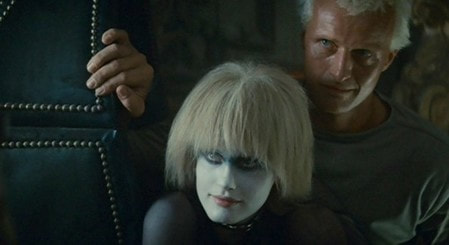Do I want one for myself? Well no, I don't want or need a sex slave doll/ companion in my life, but I would definitely use a maid or cleaner variation if one came onto the market, which no doubt, in time, they most definitely will. And this story of the humanoid sex doll has led to much discussion and debate about how human-like is too human? And whether or not is it ethical to have cyborgs in slave roles if they have been given emotional capabilities?
After much debate, I must agree that it would appear that we do possibly face a fundamentally huge problem when it comes to artificial intelligence. Putting emotional capabilities into companion dolls is one thing, but how emotionally intelligent do we really want cyborgs to be? It is not ridiculous to foresee a future where robots are looking and behaving exactly like humans, and with the ability to process much faster than us and problem solve better than we ever can and perhaps even generate realistic emotional capabilities that not only appear to be highly evolved, but feel very real for the cyborg; well the question is, is that a good or bad thing? Is that just going too far?
What if these highly developed artificially intelligent beings eventually surpass us and then identify that they are clearly more superior than us in every way and as a consequence of that, see no need to keep us around with all of our pathetic human insufficiencies? I'm talking Terminator stuff here, but seriously, are we actually putting ourselves at risk by creating such highly developed, emotionally intelligent beings?
I know this sounds totally whacky, but it turns out that some of the smartest people on the planet are actually having these exact conversations. People like Elon Musk, the CEO of Tesla and SpaceX, Stephen Hawkings and Nick Bostrom (author of Superintelligence) are actually already warning that these seemingly innocent, perhaps even endearingly interesting early examples of artificial intelligence could potentially spiral out of control and be cataclysmic to humanity in the long run.
You see the trouble is, that is we don't give AI robots emotional intelligence and they surpass us with their knowledge, then they will not care about eliminating us is we are deemed useless. However, if we do give them emotional intelligences then are we being unethical or playing God? And in light of these possible outcomes, an ongoing discussion has developed in our home about the ethics of creating cyborg maids and sex dolls that have super intelligence and highly evolved emotional ranges when they are only going to be living a life of servitude. I argued that they would only be wires and mechanics and that they could never match our emotional range, but what if eventually they could? As Zoe pointed out to me, just because it is blood and bone, it may not be better than wires and silicone, it's all just material in the end, and once the connects are made....well, they are made, and they become real for that being. So it is quite a realistic possibility that sometime in the future there will be artificially intelligent beings that are impossible to detect from humans because they are so like us, only better than us in every way. Wrap your head around that one, how does that make you feel?
It was unanimously agreed that giving 'slave' role cyborgs evolved feelings is both maniacal and totally unethical, but at the end of the day it is ridiculous to think that some people won't be doing that if they are given the opportunity. There would however certainly be some roles that an intellectually and emotionally evolved cyborg would be terrific at; like elderly care, additional needs care and respite, nursing, therapists, drug rehabilitation and child care professionals to name but a few. And then again the question arises about how ethical it is to have robots fulfilling the emotional needs of humans. As I said, I am most definitely not opposed to the idea, but it's a big concept to imagine.
Craig pointed out that the theory of an evolved artificially intelligent species wanting to destroy us could actually be completely unfounded, that perhaps in their highly evolved state they would see no reason to destroy anything at all, but would in fact become more sentient and enlightened beings that actually wanted to help us to improve. Perhaps these emotionally intelligent AI models will in fact be the key to humanity's salvation and not humanity's destruction at all.
Who really knows for sure how things will play out? But I do know that we would be pretty naive if we didn't think that cyborgs will be playing a much larger role in all of our lives in the not too distant future.

Release Date: 1982
Rating: R 18+
Running Time: 117 mins
This neo-noir science fiction thriller directed by Ridley Scott is now regarded as one of the best science fiction movies of all time. Adapted from the 1968 novel Do Androids Dream of Electric Sheep? by Philip K. Dick, Blade Runner won the BAFTA for Best Cinematography, The Hugo Award and the Los Angeles Film Critics Association Award, and although it was largely misunderstood at its time of release, it has since gone on to be recognized as a cult classic that was well ahead of its time.
The year is 2019, and genetically engineered 'replicants' are being manufactured by the Tyrell Corporation to do dangerous off-world jobs. The use of replicants on earth is strictly prohibited, so when a group of escaped replicants, who are virtually indistinguishable from humans, take up refuge in Los Angeles, it's up to expert Blade Runner Rick Deckard (Harrison Ford) to hunt them down.
This is a beautifully realized cyberpunk, dystopian future, that has been thoughtfully put together in an extremely realistic way. The replicants are wonderfully interesting, and the story plays out with an achingly human undertone. This is really intelligent science fiction, and requires some thinking on the viewer's behalf to really grasp all of the complexities that are at play here.
The cast is fabulous, with exceptionally strong performances from Harrison Ford, Rutger Hauer, Sean Young and Daryl Hannah. In the end, you will be left feeling that the replicants may have been more alive inside than the humans that tried to eliminate them; it's a timeless piece of science fiction for sure.
FINAL SAY: More human than human.
4.5 Chilli Peppers

 RSS Feed
RSS Feed